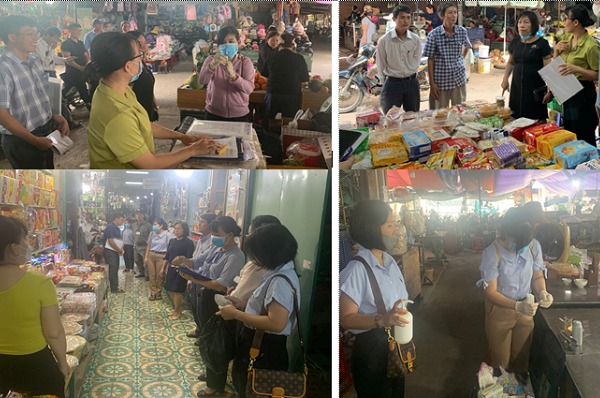Strengthening food safety management at traditional markets in Binh Dinh province
Traditional markets are places where essential goods are exchanged to serve the daily needs of the people, including many types of food such as: meat, fish, vegetables, fruits, fresh seafood, confectionery, soft drinks, processed foods, etc., which are long-standing distribution channels and play an important role in social development, creating a driving force to promote production and consumption of goods and are places that express the very unique and characteristic culture of a locality, contributing to attracting tourists to visit and shop. Therefore, it is necessary to pay attention to and strengthen food safety management at traditional markets to contribute to building the image and improving the quality of food safety at traditional markets in the province.

Checking food safety at traditional markets in the province
Currently, traditional markets in the province have basically invested in construction and upgraded infrastructure, creating favorable conditions for people to buy and sell a fairly full range of goods, especially providing a stable and regular source of food for local people. However, activities at traditional markets still face many difficulties, especially in food safety management. Implementing Directive No. 11/CT-UBND dated May 21, 2024 of the Provincial People's Committee Chairman on strengthening measures to prevent and handle food poisoning in Binh Dinh province in 2024, the Department of Industry and Trade has developed Plan No. 59/KH-SCT dated June 7, 2024 on implementing Directive No. 11/CT-UBND; Plan No. 66/KH-SCT dated July 5, 2024 on food safety inspection at a number of food establishments in traditional markets in the province in 2024 and presiding over and coordinating with the Department of Health, Department of Agriculture and Rural Development and relevant units to organize food safety inspections at a number of traditional markets in Binh Dinh province. At the time of inspection, the inspected food establishments must ensure food safety conditions according to regulations such as: Signing a commitment to ensure food safety, conducting health check-ups and confirming knowledge of food safety according to regulations; ensure conditions for equipment and tools... The inspection team quickly checked food safety indicators for some food samples being traded at food establishments inspected at the market such as: Formalin indicator (in fresh noodles, meat, fish), Rancid oil indicator (in cooking oil samples being processed for ready-to-eat food), Pesticide residue indicator (in fruit). Through inspection, the food samples tested negative. At the same time, the inspection team checked the infrastructure conditions at the markets and worked with the market management units on the implementation of market regulations for ensuring food safety; guiding, inspecting and supervising food safety work at the market. Thereby, most of the units have arranged and divided functional areas into areas, arranged separate food business areas to facilitate food business activities to ensure safety and avoid the risk of cross-contamination; have a water supply system that meets the needs of use, ensures the quality of domestic water, serves food production and trading at the market (water source from the local water supply unit); conduct propaganda on food safety to all traders in the market through the form of propaganda broadcast on loudspeakers at the market; organize inspections to remind traders to comply with food safety regulations at the establishments, remind traders of livestock and poultry food to ensure that the products sold must have a slaughter control mark; collect and treat waste generated at the market, organize water spraying to wash the fresh food trading area after the end of trading activities at the end of the market.
In addition to the above achievements, the issue of food safety management in traditional markets still has some difficulties and problems such as:
For food establishments in the market: Most food establishments in the market are small-scale, the owners do not fully understand the provisions of the law on food safety, so the application and practice of food safety knowledge at the establishment is still difficult. For market management units: The implementation of food safety propaganda is mainly through the form of propaganda broadcast on loudspeakers at the market, the propaganda content is also integrated into other propaganda content; the inspection, supervision and guidance on compliance with food safety regulations at food establishments are not carried out regularly, and no implementation plan has been developed. Regarding the infrastructure conditions at some inspected markets, they have degraded, the drainage system shows signs of damage, some lots and stalls do not have enough business space. On the other hand, the understanding of food safety regulations of a number of market managers and food producers and traders in the market is still limited, and the habits and laxity of some consumers when buying food at traditional markets also lead to the risk of food safety loss that can still occur. In order to improve the effectiveness of food safety management at traditional markets in the coming time, the Department of Industry and Trade recommends that relevant levels and sectors need to pay attention to strengthening management work to gradually remove difficulties in food safety management at traditional markets, specifically: - Strengthen inter-sectoral inspection of food safety at traditional markets, especially during peak periods of food safety in the year. - Strengthen supervision and guidance of food establishments under the management of the sector operating in traditional markets in the province to strictly comply with current food safety regulations such as: maintaining health check-ups, training and confirmation of knowledge on food safety; Keep records and invoices to prove the origin of goods; stalls must ensure safety and hygiene.
- Strengthen propaganda to market traders to absolutely only buy and sell food products that ensure quality and have clear origins. Propaganda to consumers to know and choose safe food and fully understand the dangers of using unsafe food, thereby changing consumption habits to prevent food poisoning to protect the health of themselves and their families.
- Units managing traditional markets in the area strictly implement market regulations on ensuring food safety; strengthen guidance, inspection and supervision of food safety at markets and other related contents. Ensuring food safety at traditional markets is extremely important to contribute to protecting the health of consumers. However, to effectively carry out this task, it is necessary to have more participation from the authorities in promoting inspection, information and propaganda, and monitoring food contamination risks, contributing to raising awareness and responsibility of food establishments and awareness of each citizen about the risks from using unsafe food to prevent food poisoning./.

 Tiếng Việt
Tiếng Việt 








